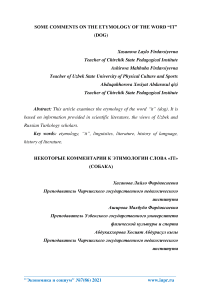Some comments on the etymology of the word “it” (dog)
Автор: Xasanova L.F., Ashirova M.F., Abduqahhorova X.A.
Журнал: Экономика и социум @ekonomika-socium
Рубрика: Современные науки и образование
Статья в выпуске: 7 (86), 2021 года.
Бесплатный доступ
This article examines the etymology of the word “it” (dog). It is based on information provided in scientific literature, the views of Uzbek and Russian Turkology scholars.
Etymology, “it”, linguistics, literature, history of language, history of literature
Короткий адрес: https://sciup.org/140259839
IDR: 140259839
Текст научной статьи Some comments on the etymology of the word “it” (dog)
Interpretation. The dog has been recognized as the closest companion of humans since ancient times. It corresponds to the eleventh year of the animal cycle of chronology account. So, it is clear from these thoughts that he was one of the animals that had an important role in the life of the Turkic peoples. One of its most important aspects is loyalty to its owner. Later it was also recognized in classical literature as a symbol of devotion.
Main part. We can clearly see this in the works of Atoi, Lutfi and Navoi. The use of the dog lexeme in this sense was due to the peculiarities of folk life and the physiology of the dog. But it should also be noted that another meaning of the dog zoonym in fiction means a negative connotation. The reason given for the assimilation of this meaning into the minds of the people is the content cited in religious views and literature. It is narrated on the authority of Abu Hurayra that the Messenger of Allaah (peace and blessings of Allaah be upon him) said: please. Ibn 'Abbas (may Allaah be pleased with him) narrated that the Messenger of Allaah (peace and blessings of Allaah be upon him) said: It is narrated on the authority of Abu Talha (may Allah be pleased with him). I heard the Messenger of Allah, may Allah bless him and grant him peace, say, "Angels do not enter a house with a dog or a picture." Salim's father reported: The Messenger of Allaah (peace and blessings of Allaah be upon him) met Gabriel. Gabriel said, 'We will not enter a house with a picture and a dog. They said " Imam al-Ghazali, whose works are recognized as an important source, likens anger, lust, anger, arrogance, jealousy, arrogance, and other vices to a stray dog in his book Ihyoi ulumiddin. Again, those who have become slaves to lust are described as dogs of grief. In addition, in the articles testifying to the mentality of the people, the millennial history, the attitude towards all dogs is unique: the dog does not know honor, the bull respects, the dog's pain is in the bone, and so on. Thus, the expression of this content by the dog is, first of all, reflected in the oral creativity, which is deeply rooted in the consciousness of the people, as well as in religious sources. The dog lexeme is expressed in the "Explanatory Dictionary of Navoi's works" as follows:
Ит – йўқолмоқ, йўқ бўлмоқ
Эй рақиб, ўзни анга тутсанг ҳам ит, Бизга раҳм айлаб анинг кўйидин ит. Муҳокамату ул-луғатайн, 12;
Ит – отмоқ, ташламоқ;
Гарчи бор дўзахча ишқинг шуъласи,
Бизни ўз илгинг била ул сори ит.
Muhokamatu ul-lug'atayn, 12;
Shavkat Rakhmatullayev's book "Etymological dictionary of the Uzbek language" gives the following explanation of the origin of the word dog: “A dog is a pet that is kept for protection, for hunting. It is pronounced in the form of iyt in the ancient Turkic language ... iyt - i: t - it. There was also the verb iyt, which originally meant "to push away," "to make push away." “In the short dictionary of Navoi's works there are also different forms of the verb dog: The word dog comes in the form of a dog and is used to mean "to throw away," to push means "to lose, to take away." In our present speech, this verb has been preserved in the form of push. There are several views on dog zoonyms in Old Turkic. One of the Russian turkologists, Sherbak, gave detailed information about the dog lexeme in his book "Names of animals in the Turkic languages". According to him, since ancient times the word dog has been widely used as a lexeme of almost all Turkic peoples.
Only in the ancient Turkic language it is said that its sound is pronounced strongly.
In short, the origin of the word dog, as stated in the works of Kashgari, the meaning of "removal" means "pushing away" depends on the folklore and Hadith, which form the basis of the consciousness and thinking of the people. Later, this content was naturally reflected in the examples of classical literature.
Conclusion. As a result, the dog lexeme began to express the meaning of lust. Thoughts about its origin can be proved on the basis of the work "Devoni lug'otit turk".
Список литературы Some comments on the etymology of the word “it” (dog)
- Абдушукуров Б. ХI-ХIV аср туркий ёзма манбалар тилидаги зоонимлар, ф.ф.н. олиш учун дисс. Тошкент, 1998
- Кошғарий Маҳмуд, Девони луғотит турк (Туркий сўзлар девони) / М. Кошғарий. - Тошкент: Ғафур Ғулом номидаги нашриёт-матбаа ижод уйи, 2017. - 488 б.
- Раҳмутуллаев Ш. Ўзбек тилининг этимологик луғати / 1-жилд, Туркий сўзлар, Тошкент: "Университет", 2000. - 600 бет.
- Шербак А.М. Очерки по сравнительной морфологии тюркских языков, "Наука", Ленинградское отд-ние, Ленинград, 1977.
- "Наука", Ленинградское отд-ние, Ленинград, Russia (Federation), 1977
- Алишер Навоий. Муҳоқамат ул-луғатайн. Матнни П. Шамсиев нашри асосида изоҳ ва таржималар билан нашрга тайёрловчи Суйима Ғаниева.Тошкент,Фан, 2000
- Имом Абу Ҳомид Муҳаммад ибн Муҳаммад ал-Ғаззолий "Иҳёу улумиддин", Тошкент: "Ғафур Ғулом" нашриёт-матбаа ижод уйи, 2014. - 512 бет.


